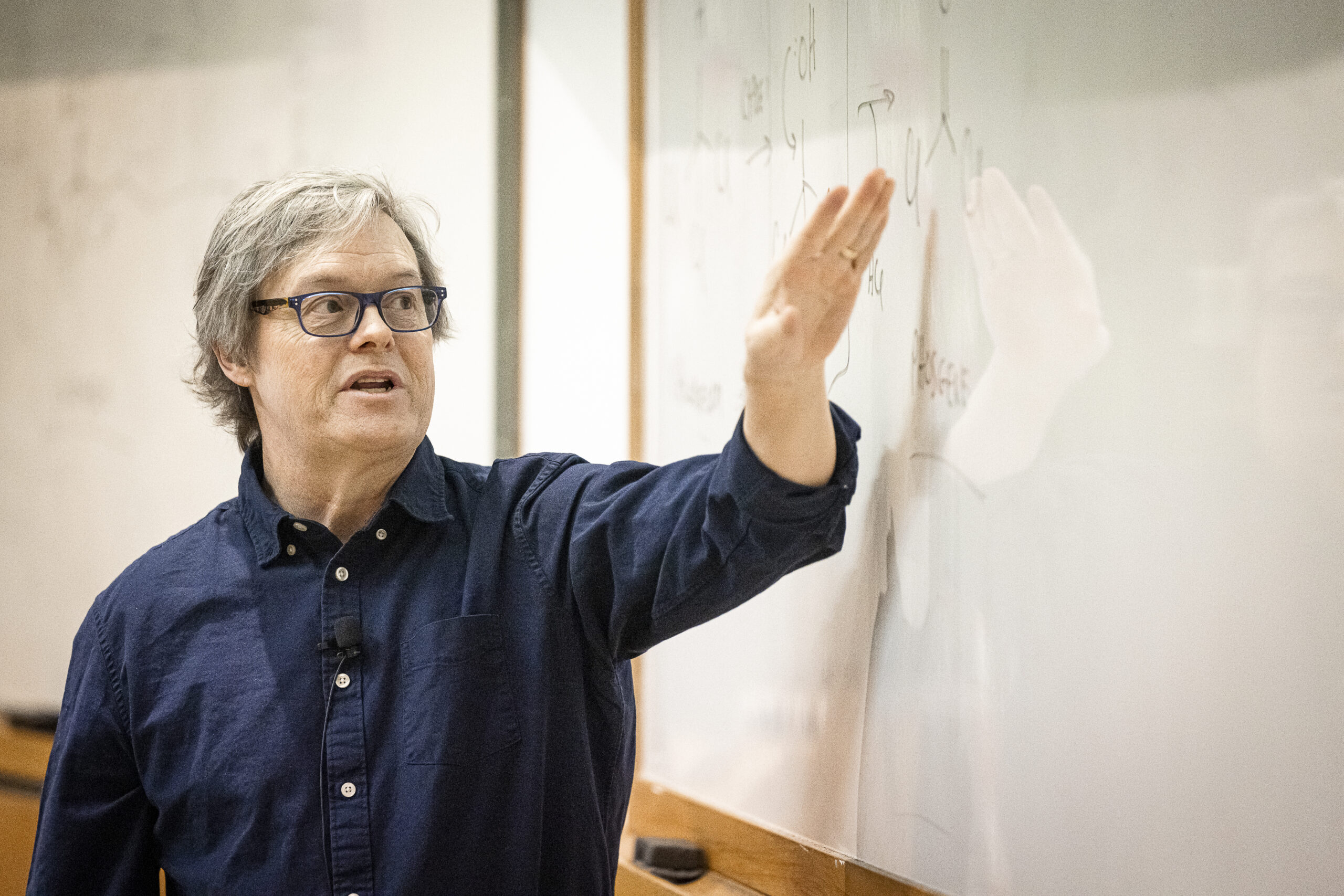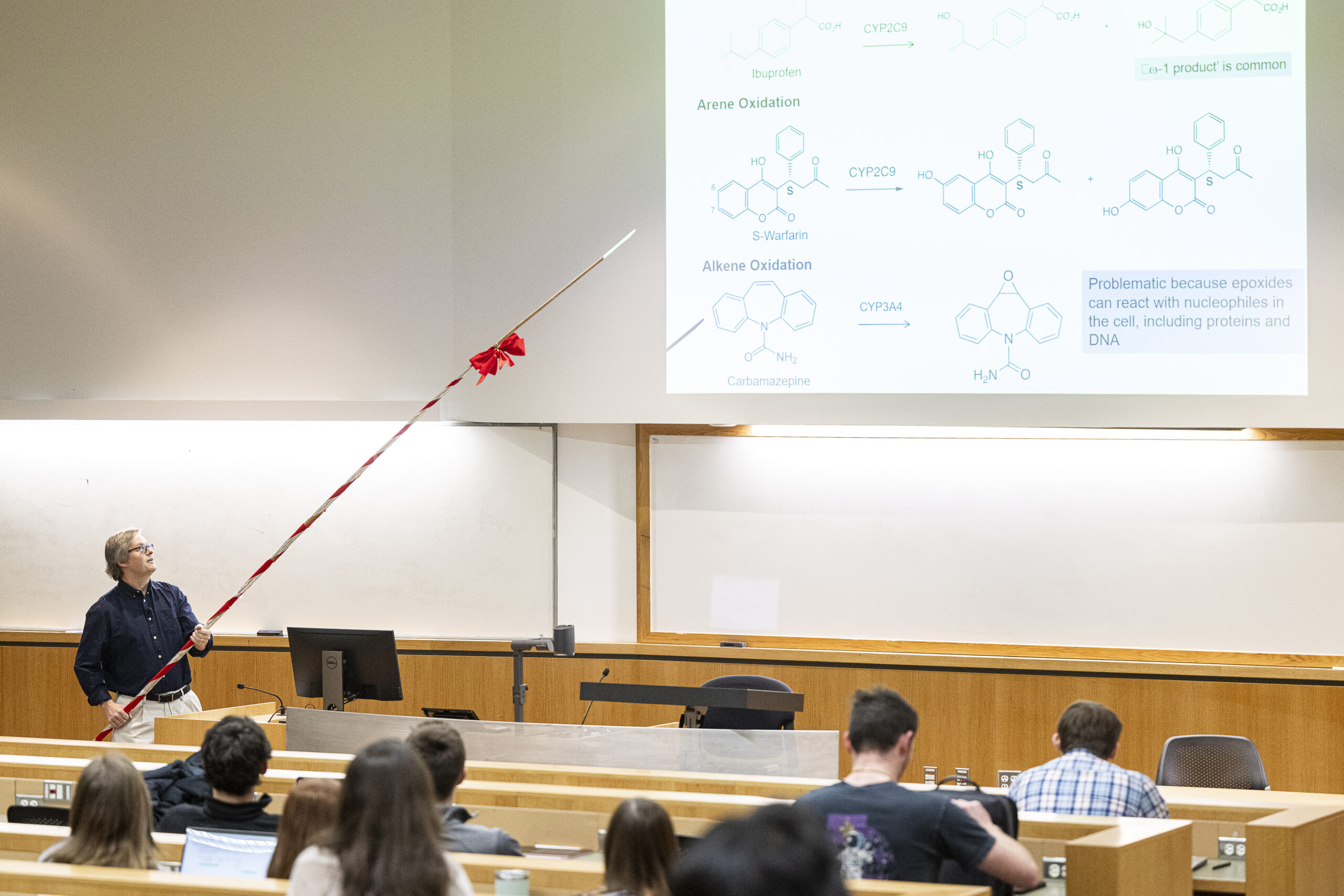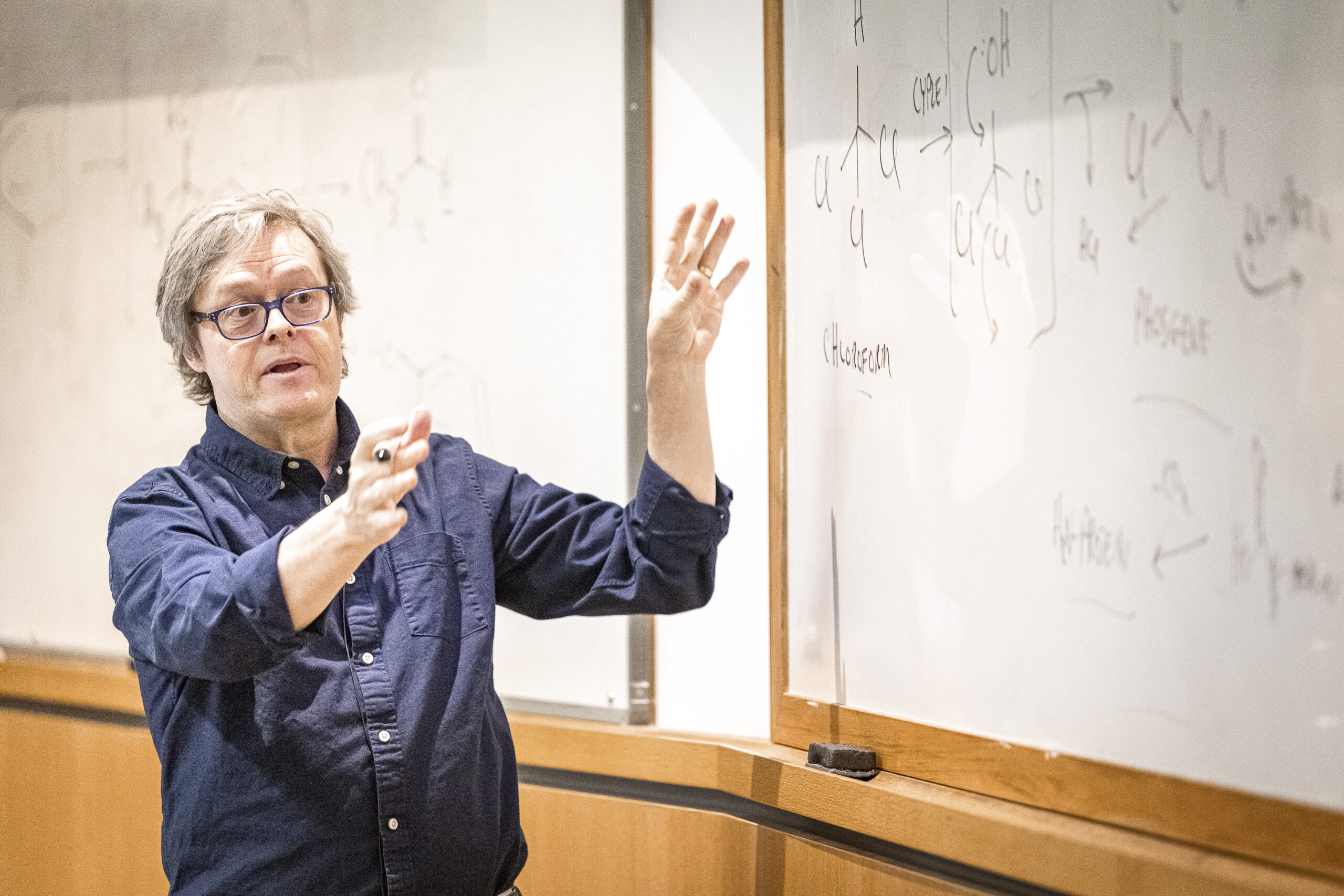An instructor at the School of Pharmacy for 26 years, Lauhon receives the Chancellor’s Distinguished Teaching Award
By Olivia Bouchard
As an assistant professor at the University of Wisconsin–Madison School of Pharmacy in the early 2000s, Beth Martin (BS ’90, MS ’03, PhD ’06) was mesmerized while watching her colleague captivate the room. In one of the School’s large lecture halls, Associate Professor Charles Lauhon, of the School’s Pharmaceutical Sciences Division, led students through case presentations focused on a disease state.
“His art of storytelling kept everyone focused on him and the next words out of his mouth,” says Martin, now professor and chair of the Pharmacy Practice and Translational Research Division and assistant dean for teaching and learning.
“At first, the ease at which he takes you on the journey of drug design and action makes you think the topic must be simple,” she says. “But then when he shows you the drug structure that works versus the one that doesn’t, you realize he is the consummate teacher in how he employs the best approaches to emphasize and support learning excellence, and that’s why it seems easy to understand.”
“Professor Lauhon is one of the most dedicated, creative, and thoughtful teachers I have ever known.”
—Steve Swanson
Lauhon’s teaching left an impact on Martin, even decades later, which pushed her to nominate Lauhon for one of UW–Madison’s highest instructor honors: a Distinguished Teaching Award.
Each year since 1953, out of the hundreds of faculty members across campus, just a dozen are selected for this special recognition, honoring some of the campus’ finest educators. And in 2023, Lauhon is joining their ranks, with a Chancellor’s Distinguished Teaching Award.
“Professor Lauhon is one of the most dedicated, creative, and thoughtful teachers I have ever known,” says School of Pharmacy Dean Steve Swanson. “He has encyclopedic knowledge of his lecture topics, is judicious in curating what information the students must comprehend to be successful and, most importantly, is gifted in his ability to inspire students to push themselves to do their very best.”
Establishing a style
Armed with a bachelor’s degree in chemistry from the Massachusetts Institute of Technology and a PhD from the University of California–Berkeley, Lauhon joined the School of Pharmacy in 1996.
Although he’s a researcher by trade — also completing a cancer research fellowship at Massachusetts General Hospital — he’s served as an instructor in the PharmD program since his first year at the School.

As most instructors at the School, Lauhon teaches across disciplines, and initially, student pharmacists were hesitant to learn from someone with such a different career path, which pushed him to advance.
“That’s a reasonable criticism, so I didn’t dismiss it,” says Lauhon. “I talked to colleagues and learned a lot from them as well as my students about to how to be a better teacher and how to figure out what pharmacy students needed to know about the topics that I was assigned.”
He worked hard to become the best teacher he could, drawing inspiration from Nobel Prize-winning physicist Richard Feynman, who often said, “If you want to master something, try to teach it.”
Lauhon was able to leverage his role doing research to augment his teaching capabilities, and vice versa.
“When your teaching and research happen to align, they’re synergistic. You learn from research where the forefront of knowledge is and where new knowledge is being created,” says Lauhon. “And through teaching, you have to go back to the fundamentals, where you can identify gaps that exist, which may inform your research direction.”
One of his most memorable — and perhaps instructive — moments involved a student spontaneously sharing feedback during a lecture.
“I remember I was writing furiously on the chalkboard, when a student suddenly stood up and said, ‘Can you please slow down?’” recalls Lauhon. “Sometimes you get swept away by a rush of adrenaline when you think you’re really in the zone and making your point very clear. But I’ve dwelt on that moment a lot — those are the moments you learn from, if you’re any good.”
“I enjoy seeing the light bulb turn on for students when you’re explaining a complicated topic, and you’re able to do it in a way that resonates with them.”
—Charles Lauhon
His students, as well as his colleagues, have been some of his greatest instructors — and greatest inspiration.
“I enjoy seeing the light bulb turn on for students when you’re explaining a complicated topic, and you’re able to do it in a way that resonates with them,” says Lauhon. “And then you can bring in a broader approach to show them the connections with other topics that they’re learning about at the time — as well as the world at large.”
A league apart
Now 26 years into his career at the School of Pharmacy, Lauhon primarily teaches medicinal chemistry-related topics to a breadth of students, covering the School’s PharmD, Pharmaceutical Sciences PhD and master’s, and Pharmacology and Toxicology bachelor’s degree programs. His research focuses on strategies for the discovery of new RNA modification enzymes in bacteria, but the courses he teaches are more broad.
“One of the topics I teach is drug metabolism, which is my favorite part of our Medicinal Chemistry course, because of its clinical relevance,” he says. “I also teach research ethics, with Professor Chris Sorkness, which includes mentoring and strategies to create safe, diverse research environments. That material has been challenging but rewarding, and I owe a lot to Professor Sorkness for her guidance in this area.”

Most recently, he has plunged into online education, assisting Cody Wenthur, assistant professor in the Pharmacy Practice and Translational Research Division, with two courses on psychoactive drugs in the School’s new MS in Pharmaceutical Sciences: Psychoactive Pharmaceutical Investigation.
“I was wary of teaching online, but the campus and School instructional design team have provided excellent training and resources,” says Lauhon. “And I’m learning an incredible amount from this cohort of students.”
Lauhon creates a more cohesive learning environment to expand students’ world view. While he credits much of what he has learned in his teaching career so far to his fellow colleagues at UW, he also believes that the craft of teaching is very individualized to each teacher.
“As a teacher, you’re always learning what works best for you, and you’re always trying to hone your craft to reach the most people,” he says.
And his students have noticed.
“He goes above and beyond to support students and help them understand,” shares one student. “He made the material accessible through his instruction and supplemental materials.”
Another student writes, “Professor Lauhon, on more than one occasion, has inspired curiosity in me by considering some of the aspects of coursework from a philosophical stance and reasoned approaches.”

While considering his teaching methods, Lauhon also keeps in mind the significance of the societal role in his students’ future careers. For example, student pharmacists will be interacting with a broad cross-section of the public.
“It’s important to teach broadly and apply critical thinking to augment the science foundation, because pharmacists can be pillars of reason in their community,” he says. “It’s a big responsibility, and I’m cognizant of that in my teaching to draw connections with material in a broader sense.”
He says that he often uses storytelling techniques, analogy, and humor — largely unplanned — to convey concepts to students. And his students repay the laughter.
Long ago, in the days of analog teaching technology, Lauhon used a 20-foot-long wooden pointer to gesture across the screen from the overhead projector. More recently, when his laser pointer failed, he went digging in between the lecture halls to find his old, trusty wooden pointer, and brought it back to class.
“Amazingly, it was still there, and at the end of the semester, they wrapped it in a red ribbon with a bow and presented it to me,” he says.
Gratitude, humility, and legacy
Through his time at the School, Lauhon has held several positions to help shape the student experience, such as serving as the assistant dean for graduate studies.
“He managed some challenging times with graduate school changes and kept students’ needs at the forefront,” says Martin.
Through her work in assessment, Martin has seen students describe Lauhon myriad ways: passionate, straightforward, relatable, extremely helpful, enthusiastic, and more.
“He creates practical, authentic, and relevant learning opportunities for students, from creating videos about drug design and action that illustrate salient points, to designing useful PowerPoint slides,” she says.
”I have benefited from years of learning from the students and from my colleagues on ways to improve. I’m indebted to them for this as well.”
—Charles Lauhon
The 2023 Distinguished Teaching Award isn’t the first time that Lauhon has been honored for his instructing prowess: He also received the Teacher of the Year Award from the first-year PharmD class in 2020, marking his seventh win — a School of Pharmacy record.
Lauhon has nothing but gratitude for his peers and students who have helped him become the award-winning teacher he is today.
“This is like an award for the School, because these awards are not earned in a vacuum. I have benefited from years of learning from the students and from my colleagues on ways to improve,” he says. “I’m indebted to them for this as well.”